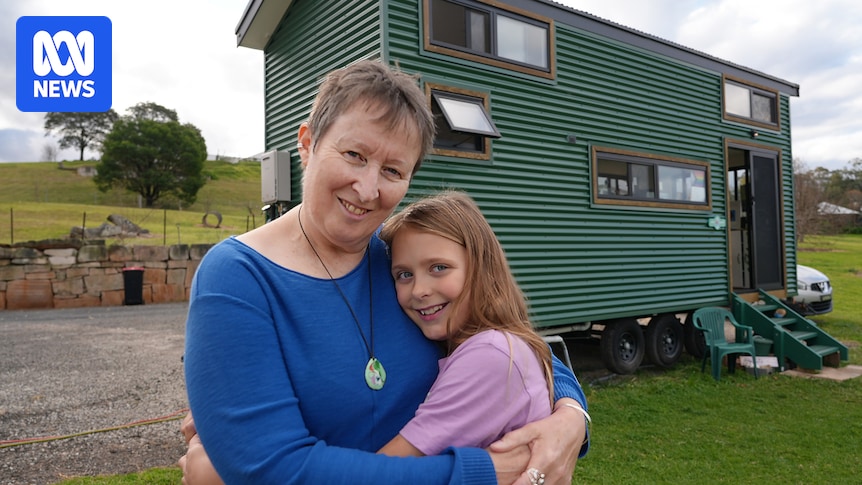
Single mother Lauren De Groot was house-sitting when she stumbled upon a Facebook post offering $55,000 to homeless or at-risk women to help build a tiny house. The catch? They had to be involved in the building process. “I thought it was a scam,” she recalls. “Why are people going out of their way to offer a bunch of strangers a heap of money?” Despite her skepticism, Lauren applied, driven by the hope of reclaiming something after enduring “three years of hell.”
Lauren’s journey to homeownership began after losing everything in a house fire in 2020. Two years later, she and her three-year-old daughter narrowly escaped a flood that devastated their rental in Lismore, New South Wales. The idea of owning a home seemed unattainable as she moved from her mother’s house to friends’ places, then to a caravan, and finally a van.
Rebuilding Lives After Disaster
Anna Glanzen, another flood victim, was living in a caravan with her son when she saw the same Facebook post. She hastily submitted “the shittiest application” while her eight-year-old son slept, hoping for a miracle. Jes Star, an aged care worker nearing retirement, also saw the post. With minimal superannuation and resources, she feared homelessness in her old age. Like Lauren, she was wary. “Who are these people?” she wondered. “Can I trust this?”
Three years later, these women are proud owners of tiny homes, experiencing a newfound sense of security. The catalyst for this transformation was the vision of two ordinary individuals who decided to tackle the housing crisis head-on.
The Vision Behind the Eden Tiny House Project
Susan Boden, a mental health liaison at a Canberra medical clinic, witnessed the harsh realities of homelessness through her work. One of her patients, a nurse, lived in her van. “At the end of the day, she’s going home to somewhere and she can’t even wash in privacy,” Susan explains. This experience prompted Susan and a Canberra GP friend to take action, using funds from an inheritance to create the Eden Tiny House Project.
The project aimed to provide a “hand up, not a handout,” offering $55,000 to 15 women to build tiny houses on wheels. In return, participants had to purchase the trailers, contribute up to $38,000 of their own funds, and secure land for their homes. The initiative received an overwhelming response, highlighting the hidden crisis among women facing housing insecurity.
“We know there’s a housing crisis in Australia,” says Susan. “But the hidden sector are women. Women with children, women who’ve experienced family violence, women who’ve taken long periods out of the workforce.”
Building a Community of Resilience
In August 2022, 15 women attended the Eden Project’s “tiny house university” in Canberra, led by tiny house expert Fred Shultz. The original plan required participants to build their homes, but the project’s flexibility allowed for various approaches, including self-building, professional construction, or a combination of both. For those opting to co-build, training in basic building and power tool skills was provided.
The journey was not without challenges. “The emotional highs and lows of the project were extraordinary,” Susan recalls. “The children got sick, they got sick, post-COVID supply chains. That swirl of emotions; a sense of hopelessness, a sense of fear, frustration. How will I do it?”
Personal Triumphs and New Beginnings
Lauren, with the help of a GoFundMe campaign and her builder father, purchased land outside Lismore. The construction process strained but ultimately strengthened her relationship with her father. “It highlighted a lot of tension between us and a lot of misunderstanding. But you can always count on dad to show up,” she tearfully acknowledges.
Anna, an outdoor educator, and her son Noah had grown accustomed to moving around the Northern Rivers shire. After the tiny house trailer arrived in Mullumbimby, Anna lived in a tent onsite, determined to be hands-on with the build. “I was so nervous that I made so many rookie mistakes. The journey has been from feeling like, ‘I don’t know how I’m going to do this’ to going, actually, ‘yeah, I can do this. I’m doing it.'” she says proudly.
“I’ve got a lot of blood, sweat, and tears in there. Every board on that inside of the house, it’s all me. I have a lot of pride in what I’ve created, and that feels bloody good.”
For Jes Star, the arrival of her factory-built tiny home in the Blue Mountains marked “the first day of the rest of my life.” It symbolized freedom from the fear of aging without a secure home. “Living in the tiny home has freed me up emotionally. I think it’s sped up my psychological work of healing from childhood trauma,” she reflects.
Looking Ahead: A Model for Change
Susan hopes the Eden Tiny House Project will inspire others to take similar initiatives. “We cannot just anymore leave things to government. We need to get out and do it,” she asserts. The project has not only provided homes but has also fostered resilience and empowerment among participants.
As Anna reflects on her journey, she says, “It’s that thing of seeing your dream coming true. Every time I come back in here, I smile. Because this is ours.”
The Eden Tiny House Project stands as a testament to the power of community-driven solutions in addressing housing insecurity, offering a blueprint for future endeavors aimed at transforming lives.







